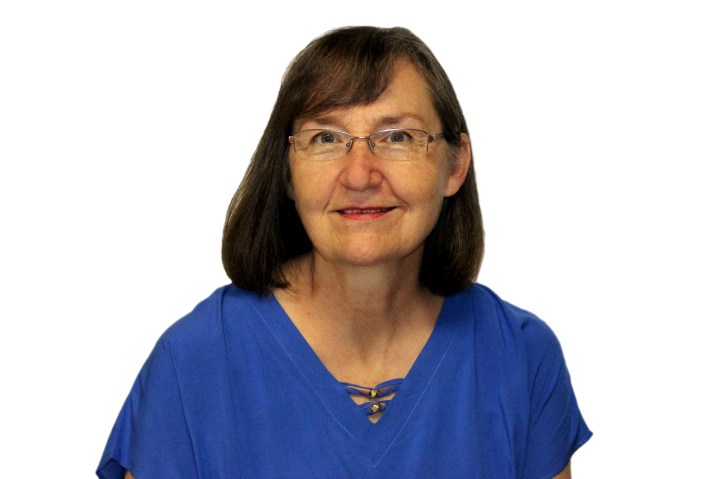DM168 DISRUPTOR
Professor Rina Swart: Food labelling a potent weapon in the fight to improve public health

Professor Rina Swart says the amount of poor-quality foods on the average South African’s plate is rising because ultra-processed foods are cheaper, more convenient options. They’re also making us ill.
First published in the Daily Maverick 168 weekly newspaper.
Stock farmers in the Northern Cape are renowned meat lovers, but in Professor Rina Swart’s family, “farm fresh” meant that fruit and vegetables were purchased from Oom Benna, a trader who stopped by every two weeks or once a month.
Swart’s childhood – spent on a sheep farm redolent of dust, dog days and a lingering funk in the air of fatty lanolin wafting from wool sheds, 20km south of the Verneukpan salt pan (“trick pan” in Afrikaans) – meant that quick trips to the supermarket were never on the cards.
Town was 100km away, along an arduous, juddering dirt road. So the Swarts produced what they could, with a small garden where only quinces and figs would survive the farm’s hard water; shopped carefully and made do with what they had.
The simple lifestyle, relentless summer heat, averaging 40°C in the shade, together with her mother’s insistence on salads and fresh fruit cemented an approach to a healthy diet that inspired Swart to study nutrition.
She is a dietician and the internationally celebrated programme leader for nutrition at the University of the Western Cape’s Centre for Excellence in Food Security.
Swart has dedicated her career to improving public health.
The Northern Cape is very arid land “so we lived frugally,” she explains. “Nothing was ever wasted. The area usually goes through 10- to 20-year cycles of drought, usually followed by a flood, maybe one or two good years and then a drought again. That area is currently in the grips of the worst drought in 31 years. I remember the flood of 1976 and, before that, there was a flood in 1961 (the year I was born).”
These formative experiences helped cement the belief that happiness should not come from a bottle or a packet. It should grow on a plant and not be manufactured in an industrial plant.
Swart says there’s a common misconception that people on farms eat meat at every meal. “Not in our house. Breakfast was usually a cooked cereal; lunch was a cooked meal; and supper a very light meal, often toast and tea.
“My mom believed in a raw vegetable every day, but no fancy salads or things; just tomato wedges or cucumber, or a carrot salad. I still like raw vegetables and sometimes serve baby carrots like that. It’s much tastier raw than cooked.”
From that grounding in “real” food, grew a passion for wellbeing, she says.
“I was always interested in health. When I was at school, I took home economics as one of my subjects. My literature was about cholesterol in diet and health matters, which always resonated with me.”
Believing that diseases should be prevented, not treated, Swart completed an Honours and a Master’s in Public Health Nutrition after attaining her dietetics qualification at Stellenbosch University. Her internship was conducted at Tygerberg Hospital.
With so much confusion around what constitutes a healthy diet, whether low carb, high fat, vegan, plant-based or even the caveman diet, Swart says a lot of the noise is not scientifically based. When it comes to nutrition, it’s all part of the overall picture. “Whether you choose to eat rice or bread or maize – it really doesn’t matter – it’s the amount that you eat and how it fits in with everything that you eat.”
She worries that the poor quality and lack of diversity on the average South African plate are rising sharply because ultra-processed foods are cheaper, more convenient options for consumers – and they’re marketed aggressively. They’re also making us ill.
It’s a vicious cycle. Consumers do not know (or ask) what is in their food as long as it is cheap and readily available, especially in the rural areas, so Big Food keeps driving up demand for products high in sugar, sodium and fat, while manipulating consumers to consume ultra-processed foods.
This fuels undernutrition, hidden hunger from nutrient deficiencies, and obesity, which leads to a rise in non-communicable diseases (NCDs) such as diabetes, hypertension, cancer and heart disease.
Before the outbreak of Covid-19, 27% of South Africa’s children were already stunted – numbers worse even than in Zimbabwe and Kenya.
It’s manipulated by industry, purely to generate an income. They market it in such a way [as] to ensure and shape the norms of society and expectations of individuals. It’s about shaping desire. Marketing plays a major role. And, for products that are less healthy, that is not a fair strategy to market it in that way.
NCDs also heighten risk to the novel coronavirus, making patients more vulnerable to becoming severely ill or dying. But in NCD prevention, too much focus is placed on personal responsibility and lifestyle, which ignores the fact that many people have limited control over their circumstances and their exposure to Big Food’s marketing activities.
It’s not all down to personal responsibility, Swart says, because “so much of the food on our shelves is a result of someone’s innovation and how great they tell consumers the product is”.
“It’s manipulated by industry, purely to generate an income. They market it in such a way [as] to ensure and shape the norms of society and expectations of individuals. It’s about shaping desire. Marketing plays a major role. And, for products that are less healthy, that is not a fair strategy to market it in that way.”
A proponent of whole food, balance and moderation, Swart says it’s best to avoid excess in anything, and not to fall for fad diets, which place the responsibility on the individual, rather than on the food system that creates the problem.
Weeks before the outbreak of Covid-19, Health Minister Zweli Mkhize warned that South Africa desperately needed to address the rising tide of NCDs, which were increasing like a “tsunami”.
Now, a year later, the beds in the hospitals that were previously filled with growing numbers of diabetic patients admitted for amputations, have been filled by Covid-19 patients. That does not mean there are fewer diabetics; they are just not seeking treatment in the same numbers as before.
That’s a worry because, already, about 60% of diabetics are undiagnosed. They will only seek care when they experience symptoms. Because their diabetes is undiagnosed, the fluctuations in their sugar level causes damage in their extremities, which is why gangrene and blindness sets in. Uncontrolled, diabetes can have nasty side effects.
International studies have shown a clear link between information and a long-term decline in NCDs. As a public health researcher, Swart has dedicated the past three years to a major study into the most appropriate front-of-package labelling for the South African context.
South Africans are not confident in their ability to understand the information provided on food containers, which is why a simple, easily identifiable warning label system is critical.
“Several countries, in their fight against obesity, have recently launched such information systems – Chile, Canada, Israel and Peru, which has also introduced a junk food tax,” Swart says.
That research has not yet been published but the department is considering how best to implement the findings. Swart says the department wants the labelling to be compulsory on all unhealthy foods that exceed recommended levels.
But one policy change will not change the problem of unhealthy food consumption – a range of complementary policies need to be introduced.
For instance, the tobacco taxes became far more effective only once they included a bouquet of policies such as bans on advertising and events sponsorship.
And while taxes such as a health promotion levy are effective, the changes in health are not going to be evident overnight.
“With the tobacco tax, years later, you can see the numbers didn’t necessarily drop but at least they are not increasing. If people consumed less sugar from beverages, we would interpret that as success,” Swart says. DM168
FIVE QUESTIONS
What is the image on your phone’s home screen?
A picture of the coastline in the Hessequa district where I enjoy walking for kilometres with only an occasional fisherman to be seen.
What would you spend your last R100 on?
Despite their objections, I would probably share it between my three sons.
What is the worst piece of advice you ever took?
It was probably to buy make-up or a pair of high-heeled shoes – both would have ended up in a dark corner in my cupboard.
The one thing you wish you learnt earlier on in your life?
To take life less seriously. Age brought some wisdom, and life after 30 was definitely more enjoyable. Life after 50 – even better!
Three books that have changed your life?
I am a compulsive reader so I read anything that crosses my path – prices at the grocery store, advertisements in a community newspaper, newspaper headlines on lampposts, fiction and non-fiction. So it is difficult to single out one book.
A piece of writing that stands out, and which I have made my own, was given to me by my grandmother when I was about 12 years old.
It reads: “Until you have formed the habit of looking for the good instead of the bad there is in others, you will be neither successful nor happy.”
I did not even notice the author’s name at the time, but now I know it was by Napoleon Hill, born in 1883.
Unfortunately I have not read his book, Think and Grow Rich, which might explain why I am not. Why have I not read the book? The title does not really inspire me to go and find it. I would rather be happy and successful in my own way than rich.
This story first appeared in our weekly Daily Maverick 168 newspaper which is available for free to Pick n Pay Smart Shoppers at these Pick n Pay stores.

"Information pertaining to Covid-19, vaccines, how to control the spread of the virus and potential treatments is ever-changing. Under the South African Disaster Management Act Regulation 11(5)(c) it is prohibited to publish information through any medium with the intention to deceive people on government measures to address COVID-19. We are therefore disabling the comment section on this article in order to protect both the commenting member and ourselves from potential liability. Should you have additional information that you think we should know, please email [email protected]"





 Become an Insider
Become an Insider